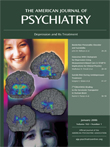Psychomotor Slowing as a Predictor of Fluoxetine Nonresponse in Depressed Outpatients
Abstract
OBJECTIVE: This study examined the utility of baseline psychomotor speed, measured with neuropsychological tests, to predict fluoxetine response in moderately depressed outpatients. The authors hypothesized that since psychomotor slowing in depressed patients has been linked to reduced dopaminergic neurotransmission, patients with slowing would be unresponsive to fluoxetine, a selective serotonin reuptake inhibitor. METHOD: After baseline neuropsychological testing, patients were treated openly with fluoxetine for 12 weeks. Thirty-seven patients completed the trial. RESULTS: Compared to the 25 patients who responded, the 12 patients who did not respond to fluoxetine exhibited significantly poorer performance in verbal fluency on the Controlled Oral Word Association Test FAS and in color naming on the Stroop Color and Word Test. In addition, the nonresponders tended to perform worse than the responders on the Stroop Color and Word Test reading subtest and the WAIS-III digit symbol subtest. Differential treatment response was specific to psychomotor speed because responders and nonresponders did not perform differently on tasks of executive functioning, attention, visuospatial functioning, or verbal intelligence. CONCLUSIONS: Psychomotor slowing may identify a subgroup of depressed patients who have a dopaminergic deficit that is unresponsive to fluoxetine monotherapy and who should therefore receive an alternative treatment.



